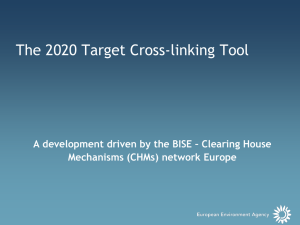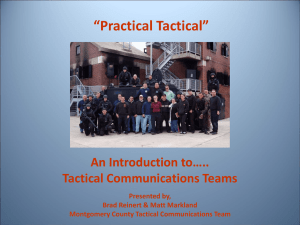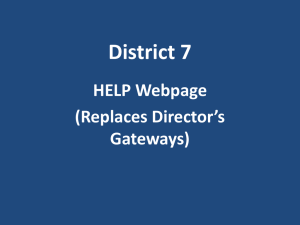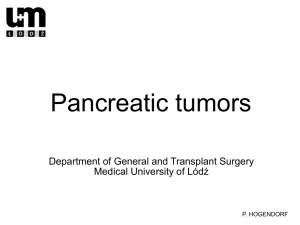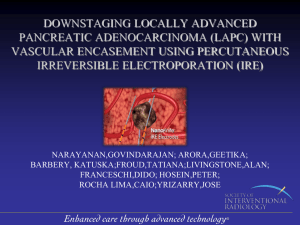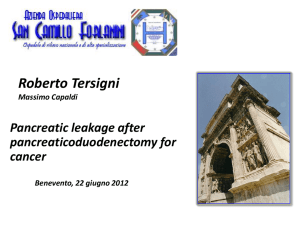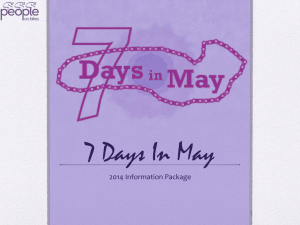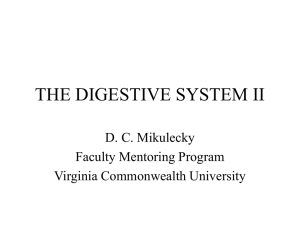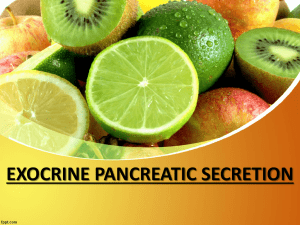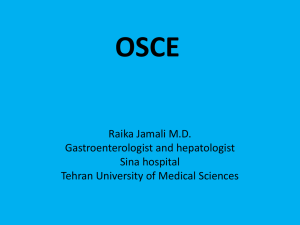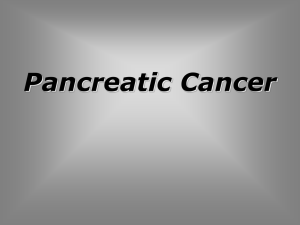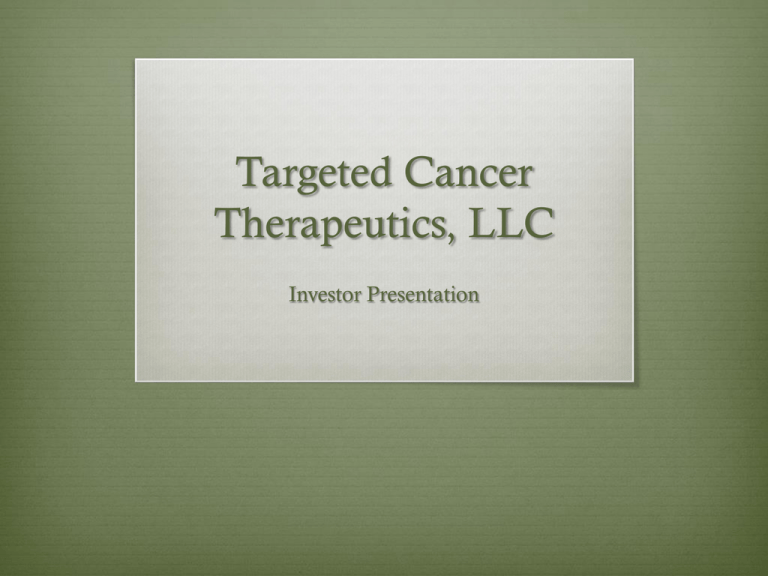
Targeted Cancer
Therapeutics, LLC
Investor Presentation
Table of Contents
Introduction
Technology
Efficacy
Safety
Market Size
Orphan Drug Status
Management
Valuation Analysis
Investment Opportunity
Use of Proceeds
Exit Strategy
Introduction
Targeted Cancer Therapeutics, LLC (“TCT”) is an
early stage company that has developed an antibody to
treat Pancreatic Cancer
Current treatment for Pancreatic Cancer does little to
either alleviate patient suffering or reduce tumor size
TCT’s therapy has been clinically demonstrated to
substantially reduce tumor size
Technology
CEACAM-6 is a tumor associated antigen (compound
produced by tumors)
CEACAM-6 is overexpressed in 90% of all Pancreatic
Cancer patients
The Anti-CEACAM-6 antibody reduces Pancreatic
Cancer tumor cell vitality
This antibody binds itself to CEACAM-6, interferes
with CEACAM-6’s function and causes “apoptosis”
(cell death a process important in preventing tumor
formation)
Efficacy of TCT’s CEACAM-6 Antibody
Anti-Ceacam 6 3mg/kg Adjusted Mean Tumor Burden
BxPC3 Cells in Nude Xenograft Mice
1800
1600
Tumor Burden (mm3)
1400
Control n=7
1200
Gem 150mg/kg n=8
1000
3mg/kg n=8
Combo 3mg/kg n=7
800
600
400
200
0
17
21
24
29
31
36
38
43
46
49
Day
51
56
60
63
66
71
73
77
80
Therapy Safety
TCT’s Anti CEACAM-6 Antibody is a highly targeted
therapy for treating Pancreatic Cancer
Highly targeted therapies are inherently less toxic than
traditional chemotherapy
TCT’s antibody has been demonstrated to possess little
toxic side effects as a result of specifically targeting a
tumor associated antigen
Market Size
Gender
Diagnosed
Death
Male
22,090
18,850
Female
21,830
18,540
Total
43,920
37,390
This table presents the prevalence rates of Pancreatic Cancer by gender within
the United States. The Pancreatic Cancer market size is roughly 44,000
individuals with significant increases projected in the coming years. The
Mortality Rate according to this data is 85%. This presents a massive unmet
medical need that TCT is poised to fulfill with its Anti-CEACAM-6 antibody.
TCT’s antibody is targeting several unmet medical needs: (1) Introduce a
Pancreatic Cancer therapy that dramatically reduces the size of Pancreatic
Cancer tumors thereby improving treating the disease and (2) Increasing the
overall quality of life for Pancreatic Cancer patients. TCT’s antibody
represents a significant improvement over existing Pancreatic Cancer
treatment.
Market Size
Race/Ethnicity
Male
Female
All Races
13.8 per 100,000 men
10.8 per 100,000 women
White
13.7 per 100,000 men
10.6 per 100,000 women
Black
17.7 per 100,000 men
14.4 per 100,000 women
Asian/Pacific Islander
10.5 per 100,000 men
8.8 per 100,000 women
American Indian
11.5 per 100,000 men
10.3 per 100,000 women
Hispanic
11.6 per 100,000 men
10.3 per 100,000 women
Incidence rates of Pancreatic Cancer for men and women in the United States.
This table demonstrates the rates of Pancreatic Cancer among various gender
groups within the United States. These numbers are expressed as percentages.
For example, White Males accounted for 13.7% of Pancreatic Cancer cases in
2012. African American Males held the largest percentage of cases at roughly
18% of all cases.
Orphan Drug Status
“Orphan Drug” reduces the time to market which
allows TCT to realize revenues sooner than most
biotech's
“Orphan Drug” will increase TCT’s ability to deliver
significant ROI for Series A investors
TCT will be applying for “Orphan Drug” status with
the Food & Drug Administration for its Pancreatic
Cancer Treatment
“Orphan Drug” status eliminates the requirement to
conduct Phase 3 Clinical Trials
Management
Dr. Mahadevan, Phd/MD, Chief Scientific Officer, is a
pioneer in the field of drug design and the study of
pancreatic cancer. Dr. Mahadevan is a Professor of
Medicine and the Director of the Phase I Program at the
University of Arizona – Arizona Cancer Center. Dr.
Mahadevan’s major area of clinical interest is in the
treatment and management of patients with Pancreatic
cancer, Breast cancer, Gastrointestinal Stromal Tumors
(GIST), Myelodysplastic Syndromes (MDS) and nonHodgkin’s lymphoma (NHL). He is one of very few
physician-scientists in the US with a Ph.D. in protein
crystallography, molecular modeling and drug design who
is also board certified in medical oncology.
TCT Risk Adjusted Valuation
450000000
417M
400000000
350000000
300000000
250000000
200000000
118M
150000000
17M
100000000
50000000
0
0
12M
90M
45M
Investment Opportunity
TCT has been funded to date by the founders and close associates,
but requires the following:
Round 1 funding of $2,500,000 (to be completed by the end of 2012)
Round 2 funding of $6,000,000 after IND approval (to be completed
prior to the end of 2013)
Self sustaining thereafter!
TCT represents a unique investment opportunity that offers a 19%
ROI in approximately 24 months
TCT’s funding requirement is so low due in part to: (1) Development
costs have already been incurred; (2) Orphan Drug status so no
Phase III trials and (3) TCT has the option of sub-licensing the
product after Phase I trials
Use of Proceeds
TCT is anticipating the following use of proceeds
following Round 1 financing:
Additional Toxicity Testing
IND Filing with the FDA
Manufacturing of the product in accordance with GMP
standards
Exit Strategy
TCT has two potential exit options
(1) Out license the products to a large biotech or
pharmaceutical company
(2) Deliver product to market under accelerated time
line generating significant cash flow then seek a larger
pharmaceutical company interested in either acquiring
TCT or licensing the product from TCT
Milestones
Animal Toxicity
Testing of
Pancreatic Cancer
Therapy
(Q1-Q4)
IND
Filing/Approval for
Pancreatic Cancer
Therapy
(Q4-Q6)
Phase I Clinical
Trials of Pancreatic
Cancer Therapy
(Q6-Q10)
Contact
If you have any additional questions or would like to
discuss investing in TCT please contact Thomas
Latino of Strategic Global Associates at 617-935-2588.

